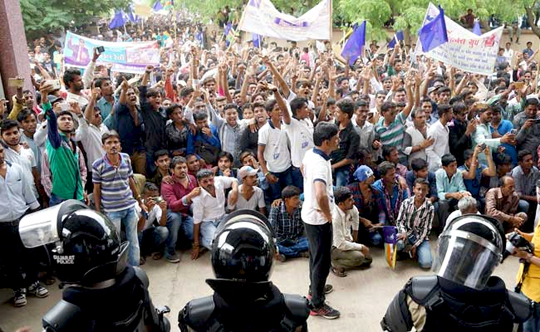Ahmedabad, Jul 29: Protesting against the thrashing of Dalits in Una, members of the community traditionally engaged in skinning and tannery work have refused to dispose of the dead cattle in several parts of Gujarat demanding that they be provided protection and I-card by the government to prevent harassment from 'gau-rakshaks'.

The decision to stay away from the work by the community members has left the administration harried, particularly in Surendranagar city where the civic body staff has disposed of more than 80 dead cattle using their own resources during the last one week.
According to Surendranagar district Collector Udit Agrawal, he will discuss the demands put forward by the Dalit bodies with the government in coming days.
"Skinners are on strike since last one week. Thus, we are engaging municipality staff to dispose of the carcasses. Even some maldharis (cattle rearers) are also helping us. Till now, we have disposed of 88 cattle in the city. We are making sure that people don't face any problem due to the ongoing stir," Agrawal said.
"Once the dust settles, I will call Dalit leaders to discuss their demands, as they have not given me anything in written yet. One of their main demands is issuance of I-cards for skinners. I will definitely put forward this demand to higher authorities for a long-term solution," he said.
The strike has been called by Dalit Manav Adhikar Movement, which is an umbrella body of several Dalit rights groups, including Navrsarjan Trust.
According to Natu Parmar of Navsarjan Trust, many Dalits across Gujarat are joining the movement.
"Many members of the community across Gujarat have joined our movement and announced that they will stay away from the work of disposing carcasses. Surendranagar has received huge response to our call, as most families of this community have completely detached themselves from this work since last one week," he said.
Parmar claimed that the district administration is now forced to dispose of at least 200 cattle every day.
According to him, around 120 cattle, mostly cows, die in 14 to 15 cattle shelters in the district every day.
"Apart from them, around 100 such cattle, owned by maldharis, die in different villages of the district every day. We will not resume our work till our demands are met. People came to know about atrocities on us only after the Una incident. Otherwise, skinners face such problems every day. We want assurance of protection from government," said Parmar.
On July 11, four Dalit youths were beaten up by cow vigilantes at Mota Samadhiyala village in Una taluka of Gir Somnath district when they were skinning a dead cow.
Though the youths pleaded that they are from the skinning community, the cow vigilantes thrashed them alleging that they were involved in cow slaughter.
One of the key demand of the community is the issuance of I-cards, so that police or 'gau-rakshaks' do not harass them while transporting or skinning a dead cow.
"We want I-cards for all the skinners, so that they do not face any problem or don't fall pray to any misunderstanding. The I-card can help us in establishing that we are not into cow slaughter. We also want government to provide land to carry out skinning work in each taluka," Parmar added.






Comments
Oh My Cowsee... This is sad... Cow Mata is lying on ground and no protector is available!
HELLO BAJARANGIS AND CHADDI PARIVAR YOUR MAA AND MAAKI HUSBAND'S ARE DEAD IN GUJARATH GO AND DO LAST RIGHTS, NOW YOU ARE NOT FEELING ANYTHING? CHEEEE SHAME ON YOU...
Ahmed I agree with you, If our muslim brothers and Moulanas had little brain, such a situation would have been seen long before.....Still it is not TOO LATE.... we can make the farmers to suffer and make them to revolt against sanghis.....
Chaddis like Naren, Bopanna are required in Gujrat, to clean the roads filled with dead go matahs.......
Moklena appe saadi d naarondundu, Itte appe bodcha?
I predicted this situation 10 years ago, i told our friends stop eating beef, these cows will stink on the roads
This is what we Muslims also get united and protest.
One month is enough, stop eating ALL types of Beef then see what will happen.
Proud HINDUTUVA Deceiver will take care as they love their cows more than HUMANS .....
Were are YOU cheddis...?
Please Hindhu Brothers U are calling Cow Matha RIght,
U people need to take care of ur matha
arrange one group for that and for anthya samskra
Naren!! Where are u. Please join the govt to bury the mother cow.
Ollullambe Naren ? Ninna gaw mate road du narondu ulla? Puna geppareg popujja?
Dead cow must be given respectful burial....should not allow for skinning...gou mata is sacred.....
where are this sanghis your mother is dying in streets and no one is there to give them last rites.... what type of son ur are shame on you chaddis
Maa ke Bete kidhar hai.....
Naren, Viren and all other GO TEam......please bury your maas.......
Time for Service, now we can see how many people love thier GO mothers......ha ha........
Bajrangi Naatak....Also cows are mating on streets.....Make Sauchalay later...try to make some good bedrooms for Cows and Bull mating......
Hum to sadak pe scene dekh dekh ke thak gaya..... Maas need privacy.
We will arrange free flight to RSS AND BAJRANGI to gujrath
Mr Nareen kotian will send to BE GUJRATAH free air ticket will be provided .....
Why the \Gau Rakshaks\" disown their dead mother?"
What non-sense, talking about I-Card?
They think Bajrangis will understand what is I-Card? or will they have any respect to the I-Card issued by Government?
Rather, give them Guns with license to protect them selves
Add new comment